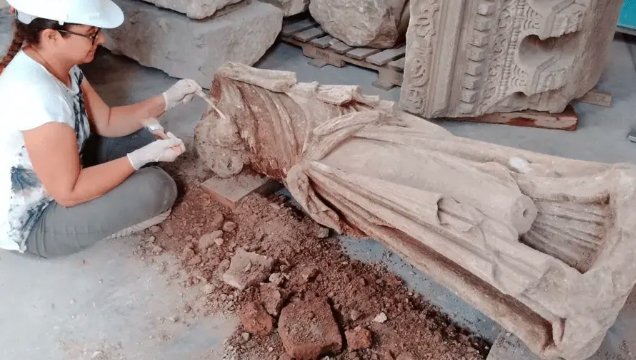In an extraordinary archaeological discovery, a team of researchers excavating the ancient Roman city of Prusias ad Hypium in northwestern Türkiye has uncovered a rare terracotta theater ticket. The find, which offers a fascinating glimpse into the ticketing system used in Roman theaters, is believed to be around 2,000 years old.
The Discovery of the Roman Theater Ticket
On November 28, 2024, archaeologists revealed the discovery of a small, round ticket made of clay, measuring roughly an inch in diameter. The ticket features an intricate floral design on the front and a row number engraved on the back, shedding light on how ancient Romans may have reserved seats for performances in theaters. This rare item was uncovered as part of ongoing excavations at the Prusias ad Hypium amphitheater, a site that has yielded numerous remarkable finds.
According to local officials, the ticket’s discovery is crucial for understanding the organization and operations of Roman entertainment venues. “This ticket is an important find that reveals the ticketing system in Roman theaters,” said authorities at a press conference announcing the discovery.

The Prusias ad Hypium Amphitheater
Prusias ad Hypium, located near the modern city of Düzce, became part of the Roman Empire around 74 BCE. The city boasts several well-preserved Roman structures, including aqueducts, bridges, and a remarkably intact amphitheater. The theater itself, which measures over 300 feet in length and 240 feet in width, still retains features such as lion claw-designed steps, vaulted passages, and a stage, offering a rare window into the past.
Excavations began in 2019, and 80% of the amphitheater has now been uncovered. Officials are working toward restoring the site, with plans to transform it into a cultural and arts center that could accommodate up to 10,000 people. As the excavation progresses, experts believe even more discoveries are waiting to be unearthed.
Additional Artifacts Found
In addition to the clay ticket, archaeologists have uncovered several other important artifacts at the site. Among the most notable is a statuette of Aphrodite, the Greek goddess of love, and a stone figure that once adorned a thyrsus, a staff associated with Dionysus, the god of wine and festivities. These finds offer insights into the cultural and religious practices of ancient Romans.
“This is a priceless discovery,” said Mayor Faruk Özlü of Düzce, who emphasized the significance of these well-preserved artifacts. “We’ve found these historical artifacts completely intact, which is a major achievement.”
Ongoing Excavations and Future Discoveries
Excavations at Prusias ad Hypium continue, with experts optimistic that additional discoveries will be made. Archaeologists believe that there may be even more historical treasures buried beneath the ancient city, potentially rewriting parts of Roman history. “There is a Roman city beneath this settlement area,” said Mayor Özlü. “Experts believe that there are more findings that could change the course of history.”
With the amphitheater set to be restored and opened to the public, this site is poised to become a key location for understanding the cultural heritage of the Roman Empire.














